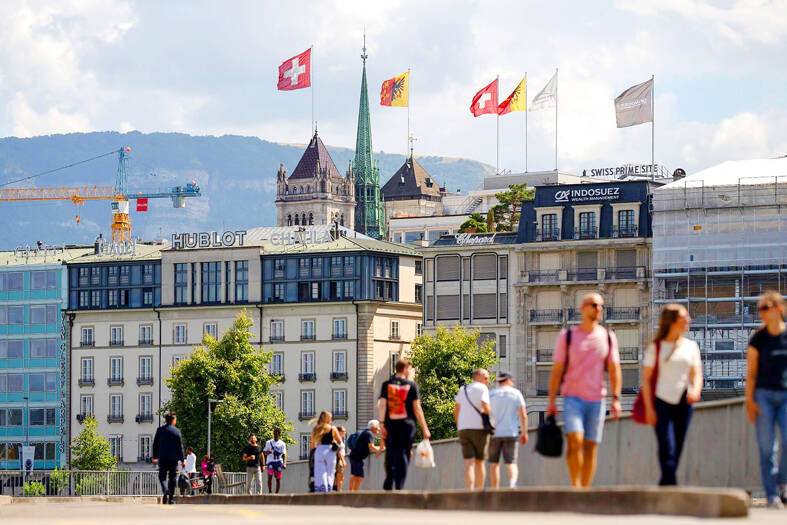Swiss stock investors are bracing for today’s market reopening after US President Donald Trump slapped a punitive 39 percent export tariff on the country, among the highest in the world.
Trump’s tariff rollout landed on a holiday, Swiss National Day, which means any market fallout would only be felt once trading resumes today.
While Trump’s fresh tariff salvo left baseline rates unchanged for many of the US’ trading partners, some, such as Canada and Switzerland, got hit with significantly higher duties.

Photo: Bloomberg
Switzerland, known for its luxury watches, rich chocolates and banking giants, is one of the US’ biggest trade partners. Last year, it exported more than US$60 billion of goods to the US, ranging from pharmaceuticals and medical devices to Nespresso coffee. So the 39 percent tariff rate is likely to roil the market today, even if some investors cling to the hope that it is just another one of Trump’s negotiating ploys.
“Clearly, the Swiss market’s first reaction will be negative, but then attention turns to negotiations,” said Andreas Wosol, head of Amundi SA’s European equity value strategies. “This is an announcement where Trump wants a reaction rather than to impose this level of tariff.”
What stings more is that Switzerland’s EU counterparts were able to secure a 15 percent tariff rate. That creates a “competitive disadvantage” for the Swiss, UBS Global Wealth Management’s chief investment office said in a note on Friday.
For Holger Schmieding, chief economist at Germany’s Berenberg Bank, it is all a prelude to negotiations.
“It will be a big shock to the Swiss market initially, but this rate is so high it’s more of a strategy to start serious negotiations rather than a final rate, which is likely to be much closer to the EU,” he said.
Meanwhile, pharmaceutical heavyweights such as Novartis AG and Roche Holding AG are facing additional pressure after Trump sent letters to 17 drugmakers last week, demanding lower prices.
“On top of the tariff strategy now comes a full-scale assault on the pricing of branded drugs sold in the US,” Oddo BHF investment head Arthur Jurus said. “Trump is applying unprecedented pressure on drug prices, directly targeting Swiss pharmaceutical giants.”
The Swiss Market Index has trailed the STOXX 600 this year, partly because of its heavy exposure to defensive versus cyclical stocks.
The Swiss index could see a delayed reaction to its European peers, after the STOXX 600 slumped 1.9 percent on Friday for its worst day since April, while France’s CAC 40, Germany’s DAX and Italy’s FTSE MIB fell more than 2.5 percent.

SETBACK: Apple’s India iPhone push has been disrupted after Foxconn recalled hundreds of Chinese engineers, amid Beijing’s attempts to curb tech transfers Apple Inc assembly partner Hon Hai Precision Industry Co (鴻海精密), also known internationally as Foxconn Technology Group (富士康科技集團), has recalled about 300 Chinese engineers from a factory in India, the latest setback for the iPhone maker’s push to rapidly expand in the country. The extraction of Chinese workers from the factory of Yuzhan Technology (India) Private Ltd, a Hon Hai component unit, in southern Tamil Nadu state, is the second such move in a few months. The company has started flying in Taiwanese engineers to replace staff leaving, people familiar with the matter said, asking not to be named, as the

The prices of gasoline and diesel at domestic fuel stations are to rise NT$0.1 and NT$0.4 per liter this week respectively, after international crude oil prices rose last week, CPC Corp, Taiwan (台灣中油) and Formosa Petrochemical Corp (台塑石化) announced yesterday. Effective today, gasoline prices at CPC and Formosa stations are to rise to NT$27.3, NT$28.8 and NT$30.8 per liter for 92, 95 and 98-octane unleaded gasoline respectively, the companies said in separate statements. The price of premium diesel is to rise to NT$26.2 per liter at CPC stations and NT$26 at Formosa pumps, they said. The announcements came after international crude oil prices

SinoPac Financial Holdings Co (永豐金控) is weighing whether to add a life insurance business to its portfolio, but would tread cautiously after completing three acquisitions in quick succession, president Stanley Chu (朱士廷) said yesterday. “We are carefully considering whether life insurance should play a role in SinoPac’s business map,” Chu told reporters ahead of an earnings conference. “Our priority is to ensure the success of the deals we have already made, even though we are tracking some possible targets.” Local media have reported that Mercuries Life Insurance Co (三商美邦人壽), which is seeking buyers amid financial strains, has invited three financial

CAUTION: Right now, artificial intelligence runs on faith, not productivity and eventually, the risk of a bubble will emerge,’ TIER economist Gordon Sun said Taiwanese manufacturers turned more optimistic last month, ending a five-month streak of declining sentiment as concerns over US tariffs, currency volatility and China’s overcapacity began to ease, the Taiwan Institute of Economic Research (TIER) said yesterday. The manufacturing business confidence index rose 1.17 points from June to 86.8, its first rebound since February. TIER economist Gordon Sun (孫明德) attributed the uptick to fading trade uncertainties, a steadier New Taiwan dollar and reduced competitive pressure from Chinese producers. Taiwan’s semiconductor industry is unlikely to face significant damage from Washington’s ongoing probe into semiconductors, given the US’ reliance on Taiwanese chips to power artificial